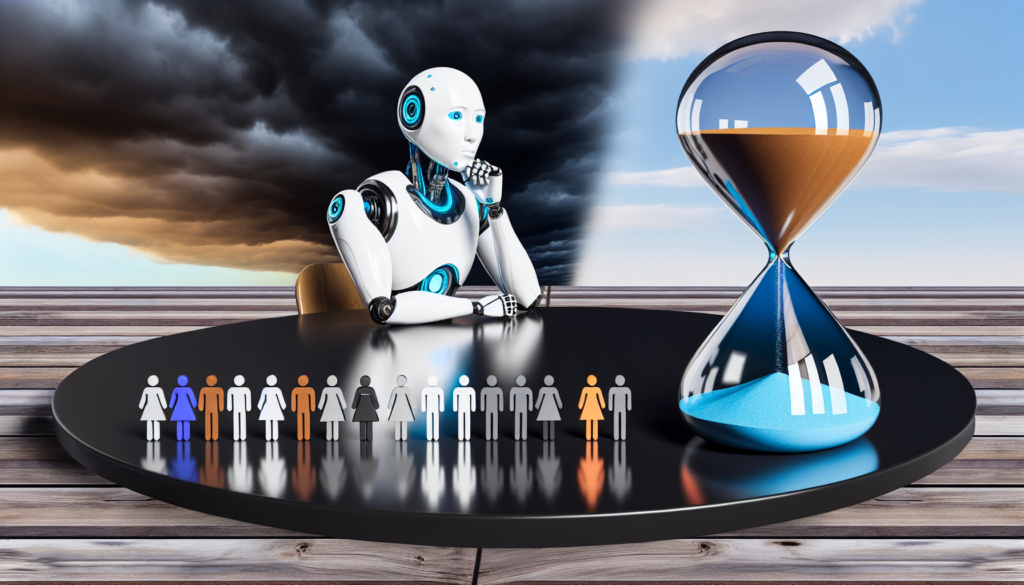The Ethical Dilemma: Balancing AI Development Pace with Societal Readiness
AI Development Pace: Risks and Consequences
The rapid pace at which artificial intelligence (AI) is advancing poses significant risks and consequences for society. As a software development agency in Los Angeles, Bee Techy is keenly aware of the challenges that come with the territory. A Vox article insightfully captures this sentiment, quoting Ajeya Cotra, who “wants to move much, much slower.” This perspective is crucial as we consider the potential for AI to outpace our societal, ethical, and legal frameworks.
The allure of AI’s capabilities can sometimes overshadow the need for caution. As AI systems become more sophisticated, the risk of unintended consequences grows. These could range from biases in decision-making to a lack of transparency in AI processes. The ethical implications are vast and demand a measured approach to development.
Moreover, the debate isn’t just about the pace of development, but also the direction it takes. Prioritizing short-term gains could lead to long-term issues that are much harder to resolve. It’s a complex balance that necessitates dialogue and, more importantly, action from all stakeholders involved in AI creation and implementation.
AI Job Displacement Concerns: A Call for Responsible Innovation
One of the most pressing concerns with the rise of AI is the potential for job displacement. As machines become capable of performing tasks traditionally done by humans, the workforce may face significant upheaval. The Harvard Gazette delves into this, with Michael J. Sandel pondering, “Can smart machines outthink us?” It’s a question that not only challenges our sense of security but also our identity as workers and contributors to society.
This concern isn’t just theoretical; it’s a reality that many are already facing. Industries ranging from manufacturing to customer service are seeing a shift towards automation. The solution isn’t to halt progress but to innovate responsibly. Companies like Bee Techy are at the forefront of this movement, ensuring that while we develop AI technologies, we also consider their impact on employment and work to create new opportunities for those affected.
Education and re-skilling become pivotal in this landscape. As a LinkedIn Pulse Article by Mohsen Yahyaei points out, “Education and awareness are crucial factors mentioned in managing AI risks.” It’s not just about mitigating job losses but about preparing the workforce for a future where AI is an integral part of the economy.
AI Regulation Debate: The Role of Governments and International Bodies
The question of how to regulate AI is one that governments and international bodies grapple with. The stakes are high, as regulations can either foster innovation or stifle it. A CNBC News Report highlights a significant step in this direction, noting that the “EU passes groundbreaking AI Act aimed at protecting users and businesses alike.” This kind of legislative action is indicative of the increasing recognition of AI’s impact and the need for oversight.
Regulation must strike a delicate balance. On one hand, it should protect individuals and society from the potential harms of AI. On the other hand, it must not be so restrictive that it hinders the technological advancements that can benefit society. This is a complex puzzle that requires input from technologists, ethicists, policymakers, and the public.
The debate is far from over, and it’s a global conversation that needs to happen. As AI technologies do not respect national borders, international cooperation is essential. It’s not just a question of if AI should be regulated, but how, by whom, and to what extent.
AI Ethics Los Angeles: Bridging the Divide Between Industry and Ethical Standards
In Los Angeles, a hub for tech innovation, the conversation around AI ethics is particularly vibrant. Bee Techy is part of this dialogue, advocating for a future where AI development aligns with ethical standards. The challenge lies in bridging the divide between the fast-paced tech industry and the more deliberate realm of ethics.
This divide is not insurmountable. Through forums, partnerships, and initiatives, we can create a common language and understanding between technologists and ethicists. It’s about building AI with a conscience, where ethical considerations are embedded in the design and deployment of AI systems.
A LessWrong post warns of the potential for a moral backlash affecting AI development. It “describes scenarios leading to moral stigmatization of AI causing significant impacts on AI research.” To avoid such scenarios, the industry must proactively engage with ethical concerns and work towards solutions that are both innovative and responsible.
Towards an AI Global Consensus: The Search for Equitable AI Progress
The quest for an AI global consensus is about ensuring that AI progress benefits everyone, not just a select few. It’s a search for equitable solutions that consider the varied needs and perspectives of different cultures, economies, and individuals.
Achieving this consensus will require a concerted effort from all parties involved—developers, users, policymakers, and the public. It’s about recognizing the global nature of AI and working together to address the challenges that come with it.
The path to a global consensus is fraught with challenges, but it’s a necessary journey. As we continue to push the boundaries of what AI can do, we must also ensure that we’re building a future that’s inclusive and fair. Bee Techy is committed to this vision, and we invite you to join us in shaping the future of AI.
If you’re looking to navigate the complexities of AI development with an eye towards ethical innovation, Bee Techy is here to help. Visit us at https://beetechy.com/get-quote to discuss how we can work together to create AI solutions that are not only technologically advanced but also socially responsible.
